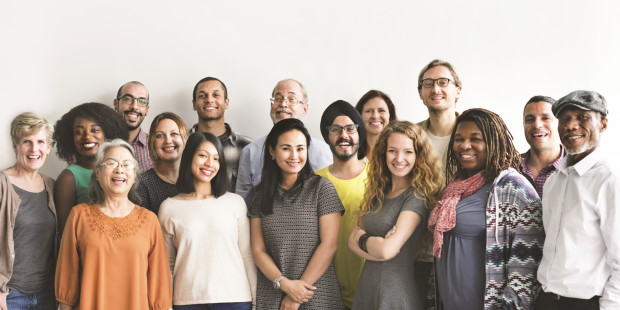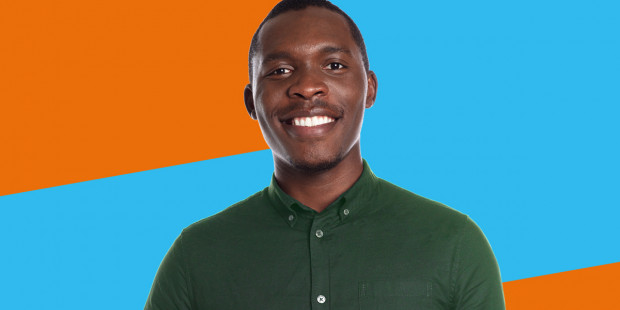Positive Voices volunteers give informative talks and education sessions to education, corporate, public sector and other audiences about their personal experiences of living with HIV.
The sessions are an opportunity to educate others about HIV prevention, transmission, treatment and living well with HIV as well as sharing personal stories of dealing with HIV stigma and discrimination.
What are our speakers’ experiences of sharing their stories?
Florence Obadeyi
Florence Obadeyi has been sharing her story through Positive Voices for over three years. She has spoken in schools, colleges and workplaces and to NHS audiences.
‘HIV stigma is a key issue in Black communities. For me, the biggest value of Positive Voices is the ability to talk to young people, including young Black students, about HIV. Positive Voices uses unique opportunities to share people’s personal stories and experiences of HIV to break HIV stigma and promote healthy sex education.
‘Having Positive Voices speakers who represent key communities, including Black communities, means that people from those communities can relate more and listen.
‘By talking to young people from these communities, they then go home and share the message with their parents who go on to share it with their peers in their community.
‘It helps to stop stigma now, but it also means we are stopping a generation from experiencing HIV stigma in the future.’
Ese Johnson
Ese Johnson started volunteering with Positive Voices last year, after struggling to come to terms with his diagnosis. He shared how volunteering with the project helped him to overcome some of the self-stigma he experienced.
‘I started volunteering with Positive Voices and those first few months of attending the training and listening to other people share the experiences they’d gone through was sort of like therapy for me. That was the first time I’d heard people say, ‘I’ve felt down and I’ve felt like life was not worth living; I’ve felt like no-one would want me. But you know what? There’s a way to get over it.’ I decided to become a speaker. After my first talk, for the first time in my entire life, I felt free. Free to tell a whole room of people I am a gay man and I accept myself. I am HIV positive and I accept myself.’
Since then, Ese has joined Terrence Higgins Trust as a staff member and has featured in our Life Really Changed campaign where he talks about getting past his diagnosis to earn his Master’s degree.
Watch Ese's story
We have big ambitions for the future of Positive Voices
Over the next three years, we’ll take our stories to new audiences in new settings right across the UK. From its beginnings as a community project in Brighton, we’ve developed into a nationwide network of speakers living with HIV. Last year, 5,255 people attended 119 Positive Voices sessions.
Working together with our speakers, we co-produced a vision for Positive Voices in early 2021. We want to ensure that the project is representative of the communities of people living with HIV and brings the wide range of stories and experiences of people living with HIV to our audiences.
Black people make up around 3% of the UK population and at least 34% of people living with HIV in the UK (Black African 29%; Black Caribbean 3%; Black other 2%). The statistics also tell us that the vast majority of people from Black backgrounds living with HIV are heterosexual.
For a variety of reasons, right now fewer than 15% of our speakers are from Black backgrounds and more than half of our Black speakers are from LGBTQ+ communities. When you compare that to the statistics, it’s obvious we have a lot of work to do to achieve our ambition of being representative of communities of people living with HIV.
As we increase from 28 to 50 speakers, we’re aiming to recruit at least 12 (and ideally 16 or more) new speakers from Black backgrounds. This will more than double Black representation within our project and amplify the voices of more Black people living with HIV. We’re looking at different ways of working so people are able to participate in ways that work for them.
In the future, we aim to bring our stories and our message to more Black community organisations, religious groups and other organisations in areas with large Black populations. We aim to reach out, listen to communities’ views, talk with them, and increase understanding of the issues around HIV. We want to help to dispel the myths, fear and silence surrounding the virus and – crucially – tackle the stigma associated with HIV.
If we work together, we can achieve the goal of ending new HIV transmissions by 2030 as well as ending HIV stigma and discrimination across our communities.
How do I get involved?
To book a talk (free of charge to schools and community & religious organisations), fill in our booking form.
If you’d like to find out more about sharing your story, get in touch with us at [email protected].
Our training programme is comprehensive and helps our speakers to share their stories with passion, purpose and confidence. Peer support is available at every stage of the process.


